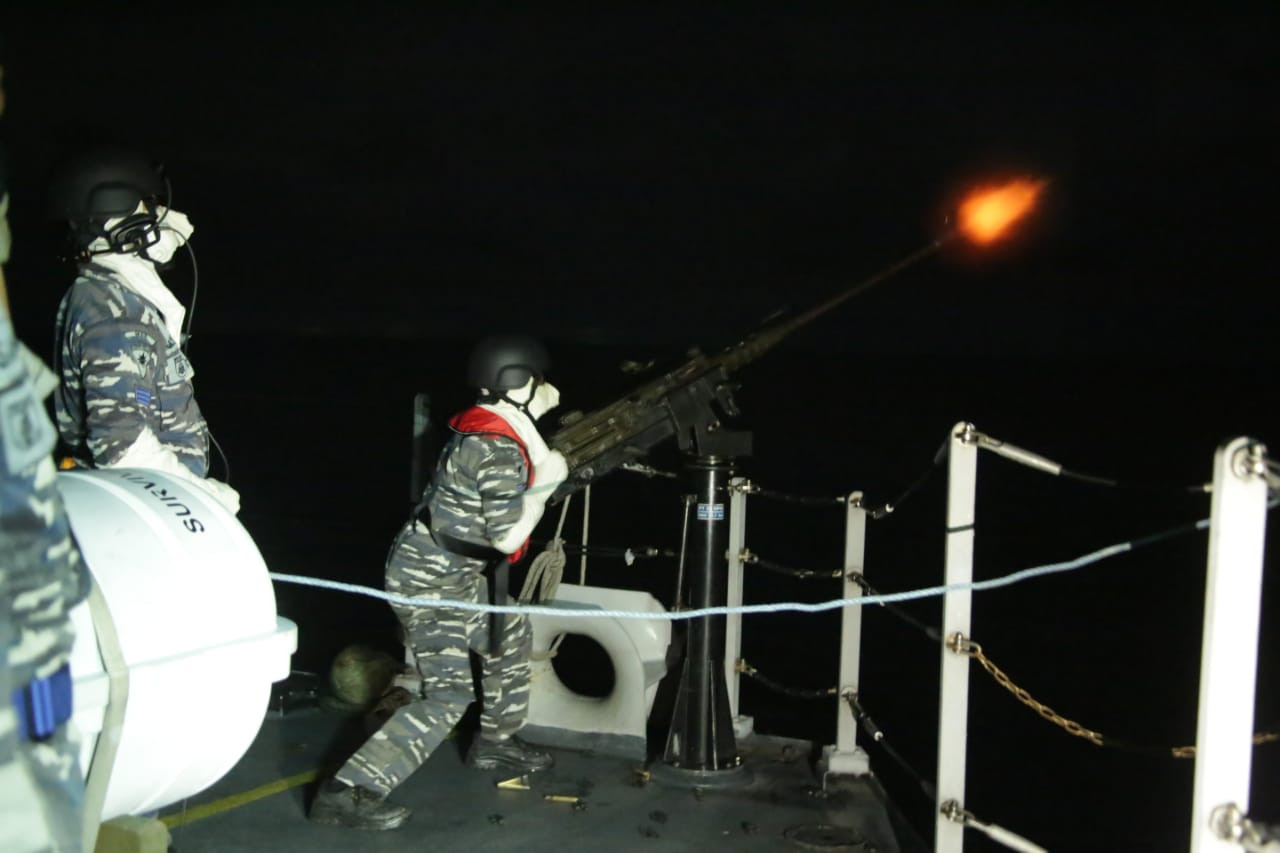Popular Reads
Top Results
Can't find what you're looking for?
View all search resultsPopular Reads
Top Results
Can't find what you're looking for?
View all search resultsMinisters in Natuna to bolster frontier
Visit to outpost set against backdrop of regional maritime tensions
Change text size
Gift Premium Articles
to Anyone
A
board a navy hospital ship, Indonesia’s chief security minister and home minister embarked on Tuesday on a two-day tour of the nation’s outermost islands adjacent to the South China Sea, in a move reaffirming the state’s commitment to developing the outlying region and safeguarding its maritime borders.
Mahfud MD, the coordinating minister for political, legal and security affairs, set sail alongside Home Minister Tito Karnavian aboard a Makassar-class landing platform dock to the Natuna island chain, Riau Islands province, to check on the progress of development at its furthest frontier.
The ministers are also scheduled to tour the archipelago’s northernmost outpost, Laut Island, by helicopter on Wednesday. The island is close to the site of Indonesia’s exclusive economic zone (EEZ), which has in recent years seen an uptick in illegal incursions by foreign vessels, including from China.
But Mahfud insists that his voyage there has more to do with the state’s plan to fortify the nation’s border regions.
“It has nothing to do with China,” he said at a joint press briefing with journalists aboard the KRI Semarang-594.
“We’re developing our borders; there’s nothing being done that is specifically geared to any one country.”
Mahfud previously drew a red line on the need to consult with Beijing on Jakarta’s exclusive rights in the area, part of which China claims to be its traditional fishing grounds, based on overreaching claims in the South China Sea.
He also accompanied President Joko “Jokowi” Widodo on a naval warship to the area in January 2020 as a symbolic gesture, after a tense maritime skirmish with Chinese Coast Guard vessels set off a diplomatic row.
Invalid claims
Tito, who was leading the tour in his capacity as the leader of the National Border Management Agency (BNPP), acknowledged that Natuna regency was a strategic border area where there were overlapping EEZ rights with Vietnam, which are overshadowed by China’s invalidated claims.
“In Natuna, we have overlapping claims with Vietnam in our EEZ [...] Secondly, we know that China also has what it calls the Nine-Dash Line as [markers for] its traditional fishing grounds, which is why there are a lot of [Chinese] fishing boats in our waters, and we don’t accept that,” he told reporters after meeting Natuna authorities on Tuesday.
An EEZ covers waters 200 nautical miles out from a nation's coastline, conferring it with exclusive rights to exploit marine resources in the column of water within the designated area, according to the 1982 United Nations Convention on the Law of the Sea (UNCLOS). Both Indonesia and China have signed the treaty.
China has claimed that based on “historical rights” in the South China Sea, its activities in the Natuna waters were meant to assert its sovereignty over the Spratly Islands, another contested maritime feature in the area, as well as sovereign rights and jurisdiction over “relevant waters” nearby.
An international tribunal invalidated those claims in 2016.
The government has also reintroduced the waters as the North Natuna Sea, further drawing the ire of Beijing.
Collective responsibility
The coordinating minister’s visit to Natuna comes off the back of a virtual ASEAN-China Summit on Monday, in which Chinese President Xi Jinping told his counterparts that Beijing would not seek “hegemony” in Southeast Asia.
At the same time, tensions over the resource-rich waters of the South China Sea continued to spike in recent weeks after Chinese coast guard ships fired their water cannon at Philippine boats delivering supplies to the Spratlys. Manila’s defense minister accused the Chinese ships of “intimidation and harassment” on Tuesday, while Beijing insisted that its permission was not sought, AFP reports.
The two countries are locked in a decades-long territorial dispute over the global trade waterway, with competing claims from Brunei, Malaysia, Vietnam and Taiwan as well. Meanwhile, talks on a set of guidelines on the rules of engagement at sea have moved at a glacial pace.
President Jokowi told Xi and other ASEAN leaders on Monday that it was “our collective responsibility” to ensure regional peace and stability and that international law was respected, Foreign Minister Retno LP Marsudi said in a prerecorded briefing after the summit. Indonesia insists it is not a claimant in the South China Sea territorial dispute.










